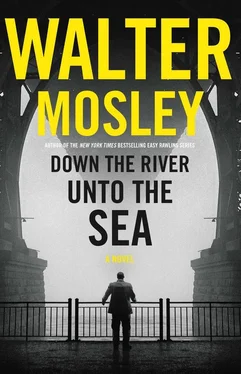There was aspirin in the go bag, bottled water too, but I preferred to feel the discomfort. It seemed an appropriate response to who and what I was.
Bob Acres showed up at exactly a quarter past one. He went to his usual table and sat down with the New York Times, Wall Street Journal, and Daily News.
I allowed him to order and be served before jaywalking to the front door of Gucci’s and through to the politician’s table. I sat without invitation and looked into my quarry’s eyes.
“Yes?” he said.
“Who told you that you were being followed?”
Acres opened his mouth but did not speak.
“I mean,” I said, “that’s the only reason you’d put your lights on a timer just this week.”
I liked Bob. He was a deviant and a Republican to boot, but we all had our dark sides. I would have been a murderer if I hadn’t fumbled that iron rod.
“Who hired you?” Bob asked.
Instead of answering I took out the iPad, played around a bit, and handed him a screen showing a full page of thumbnail stills that I’d sorted out while he got fucked.
He worked his way through the photographs, studying each one. There was no expression I could read. This made me think that he’d probably won at that poker game he attended.
“Who hired you to take these?” he asked, looking up.
I liked the guy.
“She said her name was Cynthia Acres,” I replied.
That made his eyelids tighten.
“Cindy?” He might have been a child registering his mother’s first betrayal.
“That’s what she said, but when I looked into it I found out she was a ringer sent in through a third party to gather dirt on you for Albert Stoneman.”
“So it wasn’t my wife?”
“No. Not love, but politics as usual.”
“So Stoneman hired you.”
“Probably hired me. A man named Ossa James employs the woman posing as your wife. Ossa is a paid political adviser to Stoneman.”
Acres put his right hand up with the palm confronting his face; then he rubbed the center of the palm with the fingers of his left hand.
“I don’t understand,” the congressman said. “Why would they have you bring the evidence to me instead of making it public? Why would they allow you to identify them?”
“The dollar is my master, but I ain’t no slave,” I replied. It was something my father used to say. “When I realized that the woman who hired me wasn’t your wife I got kinda mad. I once had a woman lie about me and I didn’t like it one bit.”
Acres put both his palms flat on the table.
“Is this man bothering you?” a burly man asked Bob. By his white uniform I thought that maybe he was a cook. The authoritative way he asked the question meant that he was either a thug or a member of the Orelli clan.
“No, Chris, this is an aide of another member of Congress come to deliver a message.”
Chris turned his grizzled gaze upon me. He had more muscle but I probably had better training. I had a license to carry too, but I usually left the hardware at home, or in the trunk of my Bianchina; this because of the memory of that iron rod in my calloused hand.
After the self-appointed bodyguard left, Acres asked, “So what do you want? And what’s your name?”
“Whoever told you about me didn’t give a name?”
“No. She just said that there was a detective following me.”
She.
“I don’t need a name for this talk, Congressman Acres. And what I want is not a physical thing.”
“I will not resign,” he said.
“Look, man, I’m a Democrat and an ex-cop. Three people in a motel room in New Jersey don’t mean a thing to a cop, and you bein’ a right-winger doesn’t mean much either. I’m here because a halfway-decent detective could watch you, follow you, and get pictures like those without even having to work hard at finding a way in.
“I figure it like this — either you want to get caught or you’re just so hungry for it you kind of lose your mind sometimes. If it’s the first I know a good therapist. If it’s the second I know a woman named Mimi Lord. For a competitive rate she will set up rendezvous that Sherlock Holmes could not pierce.”
“That’s it?” Bob asked when I didn’t continue.
“I’ll call the second Cindy and tell her I couldn’t find anything. They’ve already paid me for half the work. I’ll tell her she’s wasting her money, that she doesn’t need to pay the rest. But you have to do something for me.”
“How much?”
“Not money. I need to know who told you about me.”
Acres had walnut eyes to go with the golden sports jacket he wore that day. Those orbs revealed the calculating heart of the debauched representative.
It came to me that detectives and politicians were somewhat similar. We dealt in passion while pretending to be objective, if not without sin.
“I don’t know a name. Whoever it was called the office. She told the switchboard operator that she was my girlfriend. That got her to my aide. She told her that she knew about a detective investigating me when I was in New York. Our system captured the number. I could send it to you from my office.”
I liked him, even when he was trying to find my identity.
“Sure,” I said. “Send it to handy@handy9987.tv3.”
“What’s that?” he asked while writing down the e-mail.
“My electronic address,” I said, and smiled. “Tell me, Congressman, why did you go to that motel when you knew there was a detective on you?”
He looked down and then up. He shook his head and gave me the weakest smile.
“You said her name was Mimi Lord?” he asked.
I wrote down the number on a small piece of paper from a notepad I carried. Tearing out the leaf, I handed it to him.
“She’ll take care of you,” I said, and then I stood.
“What about those pictures?”
“What about ’em?”
“What will you do with them?”
“Erase them from my tablet and forget them after that.”
“How can I be sure?” he asked, reminding me of a very old popular song.
“There’s no reason for me to hurt you, Congressman. If I wanted to do that I’d either give these to Stoneman or double the price on you.”
“You said you were a Democrat,” he suggested. “Maybe you don’t like my politics.”
“Ever since Reagan busted the unions, both sides of Congress have become lackeys to the rich. They all get made, paid, and laid out of the picked pockets of men like me.”
Acres frowned a bit. Maybe he felt insulted, maybe not. At any rate he nodded at me and I returned the gesture.
I left Gucci’s Diner feeling better than I had in quite some time.
I was back in the office at a few minutes past three. My good mood had subsided in equal proportion to the memory of solitary confinement and the ramifications of Beatrice Summers’s letter.
A letter.
Who sent letters anymore? The unlined paper was tinged pink and the ink was peacock blue. The writing was even and without blobs or cross-outs. There were no misspellings, and the written lines were straight and parallel to the top and bottom of the machine-cut sheet.
All these details said something. There was intention behind that letter. One or more rough drafts were written down somewhere else and then copied onto the good stationery with a sheet of bold lines beneath it to make the lines even; onward, Christian soldiers.
The NYPD database system, which I had access to because of Patrolman Henri Tourneau, had no Adamo Cortez working anywhere in the department. The Private Investigator’s Database, which I paid eighteen hundred dollars a year for, told me that for the past nine years Beatrice Summers had lived in Odumville Township, outside of Saint Paul.
Читать дальше









